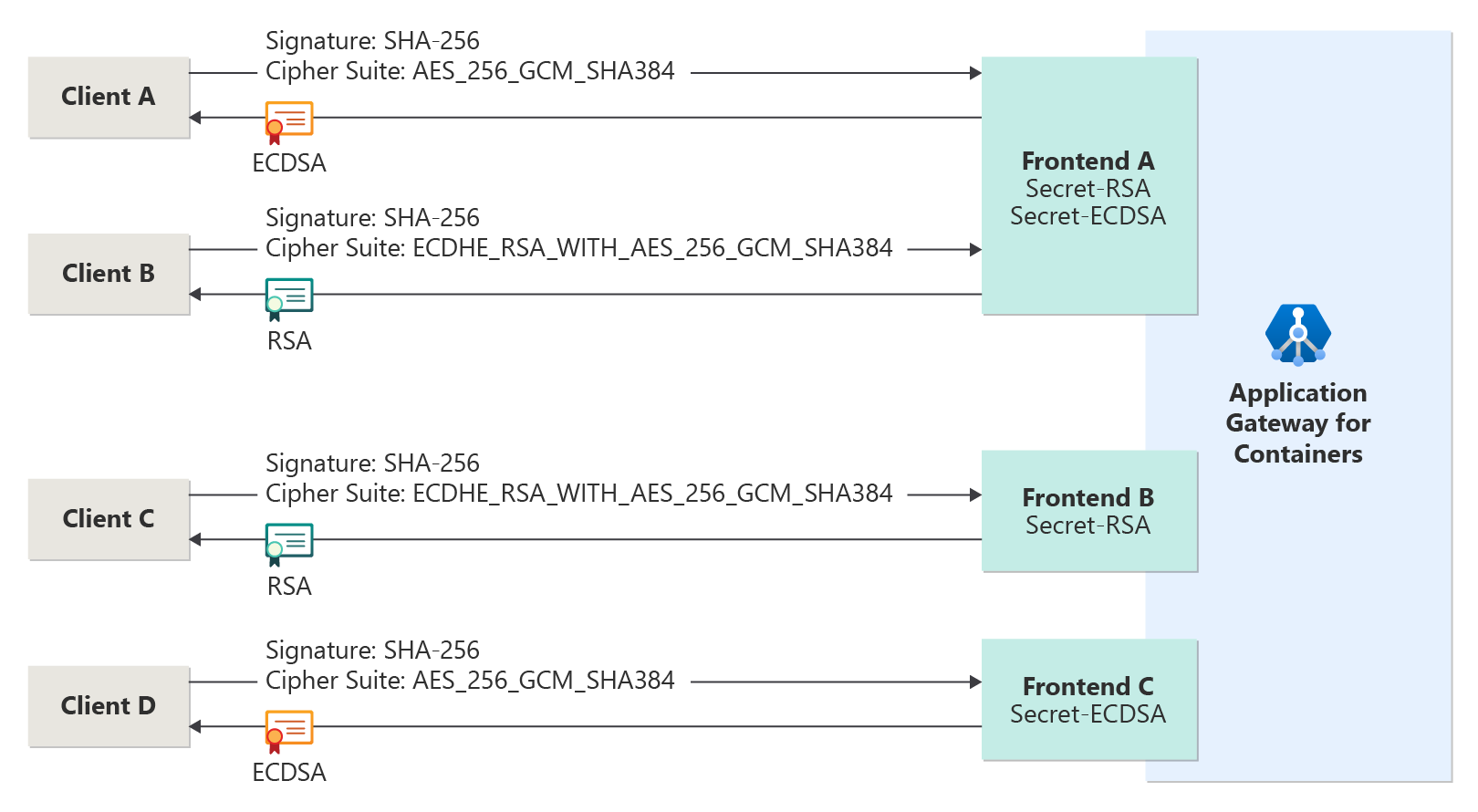ECDSA and RSA certificates for Application Gateway for Containers
Cryptography is vital in ensuring privacy, integrity, and security of data as it is transmitted between a client and server on a network. Two widely adopted cryptographic algorithms for asymmetric encryption are Rivest-Shamir-Adleman (RSA) and Elliptic Curve Digital Signature Algorithm (ECDSA).
- RSA asymmetric encryption was introduced in the 1970s and has wide device adoption today. RSA implements a simple mathematical approach to cryptography, which aids in adoption.
- ECDSA is an asymmetric encryption algorithm and successor to the Digital Signature Algorithm (DSA). ECDSA implements shorter key lengths than RSA, enabling excellent performance and scalability, while still retaining strong security. ECDSA was introduced in the 1990s, so some legacy devices might not be able to negotiate the algorithm.
Implementation in Application Gateway for Containers
To provide flexibility, Application Gateway for Containers supports both ECDSA and RSA certificates. A listener can reference either ECDSA or RSA forcing a preferred encryption algorithm, or both can be supported in parallel. Running both algorithms in parallel enables both legacy and modern clients to negotiate a secure connection via RSA, while clients that support ECDSA can take advantage of the enhanced performance and security.
Configuration of the certificates used with Application Gateway for Containers is defined within the Gateway or Ingress resources within Kubernetes. The public and private key is defined as a Kubernetes secret and referenced by name from the Gateway or Ingress resources. No designation is required within the secret resource to specify if the certificate is RSA or ECDSA. Application Gateway for Containers is programmed based on the certificate details provided.
Application Gateway for Containers provides three variations for use of RSA and ECDSA secrets:
- Two secrets: one secret containing an RSA certificate, the other containing an ECDSA certificate
- One secret containing an RSA certificate
- One secret containing an ECDSA certificate
Configure both ECDSA and RSA certificates on the same listener
- Configure Kubernetes secrets
Two secret resources are created, each with its own certificate. One certificate is generated ECDSA and the other RSA.
apiVersion: v1
kind: Secret
metadata:
name: rsa-tls-secret
namespace: test-infra
data:
tls.crt: <base64encodedpublickey>
tls.key: <base64encodedprivatekey>
type: kubernetes.io/tls
---
apiVersion: v1
kind: Secret
metadata:
name: ecdsa-tls-secret
namespace: test-infra
data:
tls.crt: <base64encodedpublickey>
tls.key: <base64encodedprivatekey>
type: kubernetes.io/tls
- Reference the secrets via a listener
Both ECDSA and RSA certificates on the same listener in Gateway API is supported by having two certificate references. A maximum of two certificates is supported: one ECDSA and one RSA.
apiVersion: gateway.networking.k8s.io/v1
kind: Gateway
metadata:
annotations:
alb.networking.azure.io/alb-name: alb-test
alb.networking.azure.io/alb-namespace: alb-test-infra
name: gateway-01
namespace: test-infra
spec:
gatewayClassName: azure-alb-external
listeners:
- allowedRoutes:
namespaces:
from: All
name: http-listener
port: 80
protocol: HTTP
- allowedRoutes:
namespaces:
from: All
name: https-listener
port: 443
protocol: HTTPS
tls:
mode: Terminate
certificateRefs:
- kind : Secret
group: ""
name: ecdsa-tls-secret
namespace: test-infra
- kind : Secret
group: ""
name: rsa-tls-secret
namespace: test-infra
